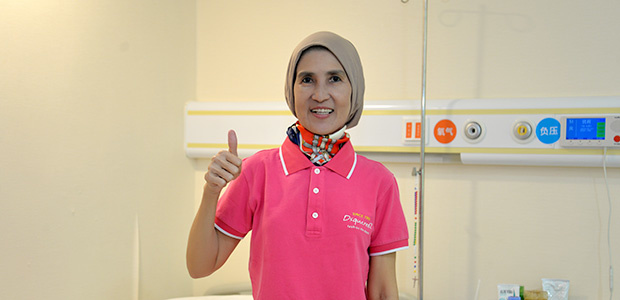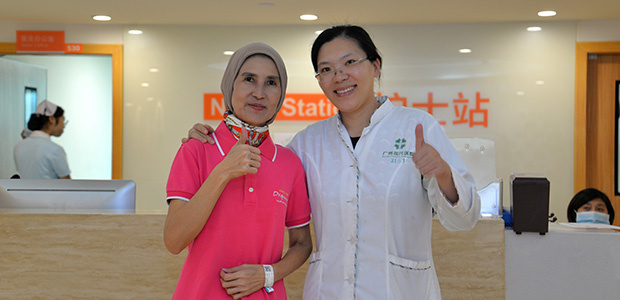I’m YULIANTI SETIAWAN, come from Indonesia. I’m a patient of stage III nasopharyngeal cancer.
Referring to my physical condition and no case of cancer in family history, none of my family thought it would be symptoms of nasopharyngeal cancer.
Recurring symptoms of enlarged lymph node in neck turned out to be stage III nasopharyngeal cancer
In Bandung, Indonesia, I took physical examination and the result indicated no cancer cells. Then I received a surgery to remove the lump in the right neck. I thought the surgery also eliminates the uncomfortable symptoms also. But things got worse later.
In the beginning of 2017, another lymph node measuring 2cm occurred on my left neck and it kept growing. In March, 2018, I decided to go to Singapore for further checkup. After a lymph node biopsy, still no cancer cells found. However, I suffered effusion in my nasal cavity.

YULIANTI SETIAWAN
Until June 2018, I was diagnosed as stage III nasopharyngeal cancer in Indonesia.
Although, I thought I was ready to brace the worst, I was desperate while being informed of the diagnosis. The common treatment for cancer are chemotherapy and radiotherapy, the patients suffer from severe pain, hair loss, overall weakness and declined immunity. Therefore, I rejected the suggestion of chemotherapy and radiation.
Nasopharyngeal cancer Survivor gave me hope
Fortunately, my son googled about St. Stamford Modern Cancer Hospital Guangzhou and learned about minimally invasive therapy, which offers an alternative option aside from chemotherapy and radiotherapy. We went to the branch office of MCHG in Jakarta for expert consultation. Through the consultation, I learned that there’re lots of cancer patients who were in worse condition before, have gained good efficacy after minimally invasive therapy in St. Stamford Modern Cancer Hospital Guangzhou. One of them even has been surviving for 8 years. Knowing that, I gained confidence in my treatment.

YULIANTI SETIAWAN with attending doctor, Dr. Ma
Interventional therapy rescued me from despair
In July 2018, I arrived at St. Stamford Modern Cancer Hospital Guangzhou. As I’ve learned about the treatment technology during the consultation in Jakarta Office. I trust doctors and minimally invasive therapy here.
The Multidisciplinary Team of St. Stamford Modern Cancer Hospital Guangzhou consists of oncologists from different disciplines. Upon arriving, I was arranged to take physical examination to conform the diagnosis and a treatment plan combining interventional therapy with natural therapy was formulated for my case after a thorough discussion. As other cancer patients described, minimally invasive therapy, being totally different from chemoradiation, causes no uncomfortable effect. The treatment procedure lasts 30-45 minutes and the day after the treatment, I was able to get off the bed and do activities as usual. What made me stunning was that, after three sessions of interventional therapy, my condition was gradually getting better and the tumor on my neck greatly shrank. The latest CT Scans indicates that the tumors on both side of neck have disappeared and regular return visit is all I need.
The battle against cancer requires perseverance. As long as you never give up and fight cancer with confidence, you’ll finally win the battle. I wish other cancer patients share the fortune, defeat cancer and regain health. We’re together in the cancer journey.
For prevention and treatment of nasopharyngeal cancer, these early symptoms should be noticed:
Mass usually occur in the neck, enlarged lymph node is the typical symptom of cancer cells;
Nosebleed, congestion , excessive mucus secretion, and blood in saliva;
Ear: Loss of hearing, pain, tinnitus, secretions.
*Surgery, in addition to the appropriate chemotherapy and radiotherapy, are effective in treating early cancer, but certain patients in late stage of cancer may not be tolerate surgery well as they can be relatively weak. A combination of carefully planned minimally invasive therapy, chemotherapy or radiotherapy can effectively reduce the side effects and discomfort of treatment and may help patient get better efficacy.













 viber
viber